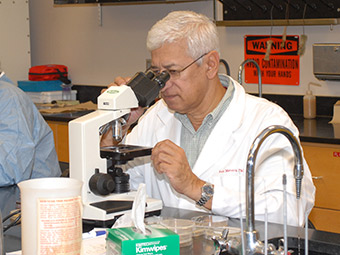Document Type
Article
Publication Date
3-27-2021
Abstract
Mosquito-borne viruses are the cause of significant morbidity and mortality worldwide, especially in low- and middle-income countries. Assessing risk for viral transmission often involves characterization of the vector competence of vector–virus pairings. The most common determination of vector competence uses discreet, terminal time points, which cannot be used to investigate variation in transmission aspects, such as biting behavior, over time. Here, we present a novel method to longitudinally measure individual biting behavior and Zika virus (ZIKV) transmission. Individual mosquitoes were exposed to ZIKV, and from 9 to 24 days post-exposure, individuals were each offered a 180 μL bloodmeal every other day. Biting behavior was observed and characterized as either active probing, feeding, or no bite. The bloodmeal was then collected, spun down, serum collected, and tested for ZIKV RNA via qRT-PCR to determine individuals’ vector competence over time. This included whether transmission to the bloodmeal was successful and the titer of expectorated virus. Additionally, serum was inoculated onto Vero cells in order to determine infectiousness of positive recovered sera. Results demonstrate heterogeneity in not only biting patterns but expectorated viral titers among individual mosquitoes over time. These findings demonstrate that the act of transmission is a complex process governed by mosquito behavior and mosquito–virus interaction, and herein we offer a method to investigate this phenomenon.
Recommended Citation
Mayton, E.H.; Hernandez, H.M.; Vitek, C.J.; Christofferson, R.C. A Method for Repeated, Longitudinal Sampling of Individual Aedes aegypti for Transmission Potential of Arboviruses. Insects 2021, 12, 292. https://doi.org/10.3390/insects12040292
Creative Commons License

This work is licensed under a Creative Commons Attribution 4.0 International License.
Publication Title
Insects
DOI
10.3390/insects 12040292



Comments
© 2021 by the authors. Licensee MDPI, Basel, Switzerland.